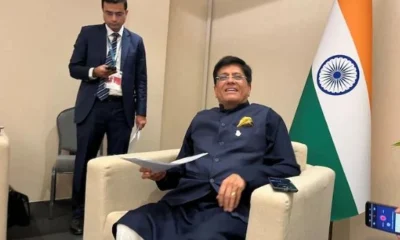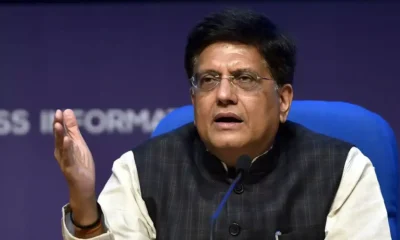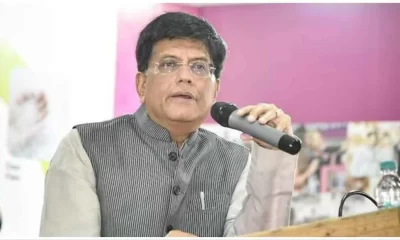The GST Council in its 28th meeting on Saturday pruned rates on a number of goods including several daily use appliances such as washing machines, vacuum cleaners, small TV sets and refrigerators.
The Council meeting chaired by Finance Minister Piyush Goyal also brought down to zero the rates on a number of products, including on sanitary pads from 12 per cent to nil. This followed a year-long protests demanding this cut on an item essential for health and hygiene of women.
The Council also gave relief to small businesses and merchants by simplifying procedures and by allowing them to file quarterly rather than monthly returns, which is expected to benefit about 93percentof the over 10 million registered GST payers, said a report in The Hindustan Times (HT).
Items in the highest slab of 28 percent have been drastically reduced as the GST Council cut tax rates on 191 goods over the last one year, leaving just 35 items in the highest tax bracket.
There were around 226 goods in the 28 per cent category when GST was implemented on July 1, 2017, noted an NDTV report.
The 35 goods, which will be left in highest slab once the new GST rates are implemented from July 27, include ACs digital cameras, video recorders, dishwashing machine and automobiles,automobile parts, tyres, automobile equipment, motor vehicles, yachts, aircrafts, aerated drinks, cement,betting and demerit or ‘sin’ items like tobacco, cigarette and pan masala.
Tax rate on ethanol to be used in autofuel blending has been lowered from 12% to 5%. Besides the pruning of the 28% slab, tax rates have been reduced on a host of handicraft items.
Other than this, GST has been brought down on an array of handicraft items from 18 per cent to 12 per cent such as handbags, wooden frames, handcrafted lamps, etc. Also, handicraft items which used to attract 12 per cent of GST such as handmade carpets, lace, hand-woven tapestries and toran have been brought under the 5 per cent GST bracket.
Experts said going forward as the revenues stabilise, the Council may look at further rationalisation of the 28 per cent slab, to restrict the highest tax slab to super luxury and sin goods.
“The rate cuts would lead to a revenue loss of about Rs. 6,000 crore,” the official said. He, however, said that the revenue loss would be only notional as increased consumption and compliance would lead to more revenues to the exchequer.
“The reduction of GST rates from 28 per cent to 18 per cent shows that directionally, the Government seems to be clear that the 28 per cent rate should be restricted to super luxury and sin goods,” EY Partner Abhishek Jain was quoted by NDTV as saying.
The move to cut tax rates on items of mass consumption comes ahead of the next round of assembly elections in the states of Rajasthan, Madhya Pradesh and Chhattisgarh towards the end of the year and national polls in 2019.
Goyal said the focus of the Council was to simplify the tax regime, rationalise tax rates and give relief to small businesses, not merely revenue collection. The minister said that the revenue impact of rate cuts was marginal and better taxpayer compliance and improved consumption in the economy will more than offset the loss.
“I believe when we assess the impact of the revenue forgone and improved compliance and job creation after one year, every state will benefit,” said Goyal.
The next meeting of the Council on 4 August in the capital will exclusively focus on micro, small and medium enterprises (MSME) and on boosting digital payments, reported HT. The idea is to promote employment and entrepreneurship in the MSME sector, the minister said.
Changes in GST rates on goods and what will get cheaper:
- Reduced from 28 per cent to 18 per cent
Washing machines
Vacuum cleaners
Domestic electrical appliances such as food grinders and mixers & food or vegetable juice extractor, shaver, hair clippers etc
Televisions up to the size of 68 cm
Refrigerators, freezers and other refrigerating or freezing equipment including water coolers, milk coolers, refrigerating equipment for leather industry, ice cream freezer etc.
Storage water heaters and immersion heaters, hair dryers, hand dryers, electric smoothing irons etc
Lithium-ion batteries
Paints and varnishes (including enamels and lacquers)
Glaziers’ putty, grafting putty, resin cements
Special purpose motor vehicles. For instance, crane lorries, fire fighting vehicle, concrete mixer lorries, spraying lorries
Works trucks (self-propelled, not fitted with lifting or handling equipment) of the type used in factories, warehouses, dock areas or airports for short transport of goods.
Trailers and semi-trailers
Miscellaneous articles such as scent sprays and similar toilet sprays, powder-puffs and pads for the application of cosmetics or toilet preparations
2.From 28 per cent 12 per cent
Fuel Cell Vehicle(compensation cess will also be exempted)
- From 18/12/5 per cent to Zero
Sanitary Napkins
Stone/Marble/Wood Deities
Rakhi (other than that of precious or semi-precious material)
Coir pith compost
Sal Leaves, siali leaves and their products and Sabai Rope
PhoolBhariJhadoo (Raw material for Jhadoo)
Khali dona
Circulation and commemorative coins, sold by Security Printing and Minting Corporation of India Ltd (SPMCIL) to Ministry of Finance.
- From 12 per cent to 5 per cent
Chenille fabrics and other fabrics under heading 5801
Handloom dari
Phosphoric acid (fertilizer grade only)
Knitted cap/topi having retail sale value not exceeding Rs 1000
- From 18 per cent to 12 per cent
Bamboo flooring
Brass Kerosene Pressure Stove
Hand Operated Rubber Roller
Zip and Slide Fasteners
- From 18 per cent to 5 per cent
Ethanol for sale to oil marketing companies for blending with fuel
Solid biofuel pellets

























